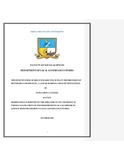Please use this identifier to cite or link to this item:
https://cris.library.msu.ac.zw//handle/11408/2444| Title: | The effectiveness of results based financing in the provision of better health services. A case of Rushinga health institutions. | Authors: | Muwanikwa, Tatenda | Keywords: | Results based financing | Issue Date: | Oct-2015 | Publisher: | Midlands State University | Abstract: | The research study focused on the effectiveness of Results Based Financing (RBF) in the provision of better services within health facilities. The main motives of this research are to examine the forms of RBF being partaken by health service providers in ensuring changes in the health sector, to identify the various challenges experienced in the implementation of RBF, to analyze the influence of RBF towards a motivated health workforce within the operating circles, to assess the extent of community participation in the implementation of RBF by health facilities, furthermore to recommend solutions to thwart the challenges experienced in rural health institutions. Methods of assessing the effectiveness of RBF were discussed in depth in the literature review phase. The study reveals the empirical evidence about the performance of RBF in an effort to curb maternal and under-fives deaths. RBF can be effectively implemented through the availability of the required resources and timely disbursement of the funds to allow early strategic planning. The results obtained from the research findings indicated that political will and commitment should be the key in ensuring the uplift of developmental reforms within rural communities. This would aid in enhancing the effectiveness of RBF in the health clinics. In this regard, related literature was critically analyzed thus different scholarly views were postulated concerning various themes identified by the researcher hence RBF was thoroughly defined, forms of RBF intended to assure changes in the health arena, issues of community participation as well as motivation of health employees to perform better were well articulated. In the research methodology section the researcher used both the qualitative and quantitative research designs. The target population of the study was 198 individuals with a sample size of 40 participants thus 18 from expecting and mothers with under-fives, 4 from the community leaders (CEO, DA and councilors), 12 from health workers and 6 from the management within the health field. Focus group discussions, questionnaires and interviews were used to acquire primary data in the research. Sampling techniques namely Stratified, Simple random sampling and purposive sampling were used to obtain information from the rightful participants. The presentation of the research findings reveals the forms of RBF used in Rushinga health facilities. The participants also unfolded the challenges that are encountered in the execution of RBF. Community participation was indicated as a critical area which need to be considered if RBF is to be effectively nailed. It was noted that employees within the health field requires motivation through motivational platforms such as early disbursement of funds and deployment of health workers in influential posts. More so it was resolved that there should effective engagement of women who are the beneficiaries of RBF in decision making on health related issues and also awareness of the health program should be fostered through awareness campaigns. | URI: | http://hdl.handle.net/11408/2444 |
| Appears in Collections: | Bsc Local Governance Studies Honours Degree |
Files in This Item:
| File | Description | Size | Format | |
|---|---|---|---|---|
| Muwanikwa.pdf | Full text | 1.11 MB | Adobe PDF |  View/Open |
Page view(s)
104
checked on Feb 14, 2026
Download(s)
30
checked on Feb 14, 2026
Google ScholarTM
Check
Items in MSUIR are protected by copyright, with all rights reserved, unless otherwise indicated.



